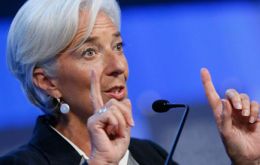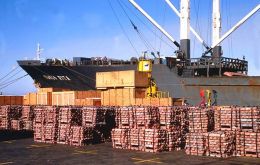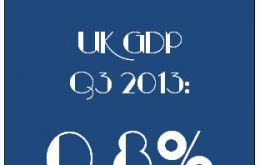MercoPress. South Atlantic News Agency
Economy
-
Wednesday, November 13th 2013 - 06:22 UTC
New oil resources does not mean an era of abundance cautions IEA

Technology and high prices are opening up new oil resources, but this does not mean the world is on the verge of an era of oil abundance, according to the International Energy Agency’s (IEA) 2013 edition of the World Energy Outlook (WEO 2013).
-
Wednesday, November 13th 2013 - 00:16 UTC
Uruguay sends bill to parliament banning ownership of land by foreign companies or governments

The Uruguayan government sent a draft law to parliament Tuesday that would ban the ownership of land by companies if they are in any way linked to foreign countries. The measure states it “aims to avoid the risk of foreign states breaching the sovereignty of the Uruguayan state in the absence of appropriate regulations and occupying a significant position in agricultural activity.”
-
Tuesday, November 12th 2013 - 08:14 UTC
Maduro promises more price controls while bargain hunters empty appliance stores

Venezuelans stood in lines outside appliance stores for a fourth day on Monday after President Nicolas Maduro deployed the army to force retailers to slash prices. After taking control of several appliance stores last week, Maduro vowed late Sunday to step up inspections of businesses selling shoes, clothes, automobiles and other goods to make sure they aren’t gouging consumers.
-
Tuesday, November 12th 2013 - 08:10 UTC
Lagarde praises Argentina's 'positive progress' in reforming economic data quality

Argentina has made “positive progress” in reforming the quality of its economic data, the head of the International Monetary Fund said on Sunday, adding that the IMF's board is set to review the country's moves in a few days.
-
Monday, November 11th 2013 - 18:56 UTC
Majority of Chileans, 83% support nationalizing copper, but it's not an issue of the presidential campaign

In an annual poll released last month, 83% of Chileans voted positively when asked “Are you in favor or against the proposal to nationalize copper?” — registering overwhelming support for a prospective reform that, while radical, remains relatively low on the list of campaign hot topics the November 17 presidential election.
-
Monday, November 11th 2013 - 18:41 UTC
YPF announces discovery of conventional oil well in Mendoza: 15m barrels

Argentina's nationalized YPF has discovered a new conventional oil well in the western Mendoza province, which will add 15 million barrels of crude to its reserves. Initial production at the El Manzano bloc and the Mirador del Valle x-1 well at 1,789 meters deep is expected to be around 535 barrels per day, the company said.
-
Monday, November 11th 2013 - 13:21 UTC
Brazil's 2013/14 crop estimated to reach in excess of 192.4 million tons

Brazil's coming 2013/14 grains and oilseeds harvest has been estimated between 192.4 and 196.6 million tons with an increase in the range of 3% to 5.3% over the previous crop which reached 186.8 million tons.
-
Saturday, November 9th 2013 - 18:34 UTC
S&P downgrades France's credit rating but market reactions were contained

Another setback for the French government as the rating agency Standard & Poor’s cut its appraisal of the country’s credit worthiness. It reduced its rating one notch to AA from AA+.
-
Saturday, November 9th 2013 - 18:27 UTC
Bank of England leaves rates unchanged; focus on next week's inflation report

Bank of England has left interest rates unchanged at 0.5% and made no change to its program of quantitative easing, as had been widely expected. The decision came as no surprise as the Bank has said it will not consider a rate rise until the unemployment rate falls below 7%.
-
Saturday, November 9th 2013 - 18:21 UTC
US economy picking up: more jobs in October and 2.8% growth in third quarter

The US economy added a better-than-expected 204,000 jobs in October, according to the latest figures from the Labor Department. There had been fears that the 16-day shutdown of government services last month could have hit jobs growth.
